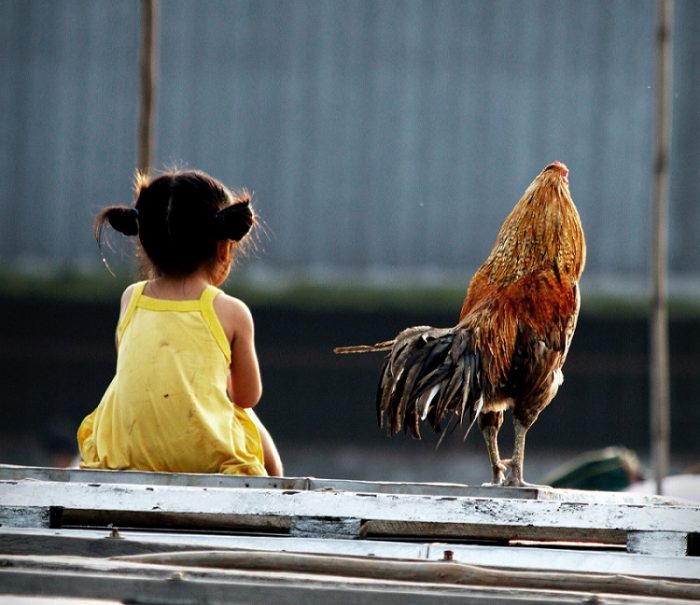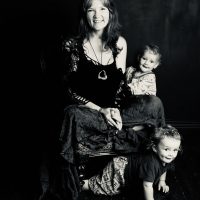Some days, I despair at this world, at this life.
The days are beautiful, and living in the moment is bliss, but to look much further ahead or even wider afield than just today and this tiny spot on Earth weighs so heavily.
Thinking about the world my children will inherit fills me with dread. To see how blindly many continue to consume both resources and lives of people and animals, contributing to the end of the world and its beauty for those they profess to love the most—their children—is depressing.
I’d hoped we would come out of COVID-19 a changed world—changed for the better—but I feel that hope turn to despair as I see the world go on as normal.
Then I remember Joanna Macy’s Shambhala Warrior Prophecy and it calls to my heart:
“There comes a time when all life on Earth is in danger…weapons of unfathomable devastation and death, and technologies that lay waste to our world. It is now, when the future of all beings bangs by the frailest of threads, that the kingdom of Shambhala emerges. Now you cannot go there, for it is not a place. It exists in the hearts and minds of the Shambhala warriors.
But you cannot recognise a Shambhala warrior by looking at them, for there is no uniform or insignia. They carry no banners to show whose side they are on. They build no barricades on which to comb, from which to threaten the enemy or behind which to rest and regroup. Shambhala warriors have no home turf of their own. Always they move on the terrain of the barbarians themselves.
Now is the time when great courage is required of the Shambhala warriors—moral and physical courage. To dismantle these weapons…they must go to where they enter in the corridors of power, where the decisions are made. The Shambhala warriors know they can do this because the weapons are manomaya, mind made. These weapons are made by the human mind; they can be unmade by the human mind.
The Shambhala warriors know that the dangers that threaten life on Earth do not come from satanic deities or extraterrestrial powers. They arise from our own choices, our habits and relationships. So, now, the Shambhala warriors must go into training…One weapon is compassion, the other is wisdom. We need compassion because it provides the fuel, it moves us to act for the sake of all beings. What it boils down to is not being afraid of the suffering of our world…but this weapon is so hot it can burn you out.
So we need the other weapons as well…it lets us see that the battle is not between good people and bad people, but the line between good and evil runs through every human heart. We realise that we are interconnected, as in a web, and that each act with pure motivation affects the entire web, bringing consequences we can not measure or even see. However, by itself, wisdom can be seen as too cool to keep us going. So, we need the heat of compassion as well, our openness to the world’s pain.
Both weapons, or tools, are necessary to the Shambhala Warrior.”
Her words tell me that we are being called to train these warriors, for they are our children.
We need to not be afraid to look the suffering in this world full on. To not turn away from it, but to also believe in hope and be able to see all the beauty in this world, too. To have the wisdom to know that it is us and the choices we make that will change the world we live in. To have the heart and courage to live in empathy with all, and work toward a fairer, kinder, healthier world.
James Martin, British Information Technology consultant and author, has written numerous books predicting trends that have so much momentum, they are unlikely to stop. He often seems like a fortune teller, but his fortunes are based firmly in science and research, and so often come strikingly near to the truth. For example, he predicted an airborne virus so devastating that it could change the course of the world; he did this not because he is magic, but because the information was already there, the pieces all in place showing it was a likely outcome.
In his 2007 book, The Meaning of the 21st Century: A Vital Blueprint for Ensuring Our Future, Martin also discussed how while some countries and individuals would get increasingly more rich, other individuals and countries would end up so poor that they wouldn’t be able to find a way out. He predicted that the gap between rich and poor would continue to grow, again, not based on prophecy but on current trends and how they were expected to proceed. These trends have the potential to lead our world—gaia, our beautiful planet—to become so sick she can no longer sustain us.
But he also talks about solutions. And one of them is our children.
He calls them the transition generation—here to help us make the transition through this time of many changes. How our children view the world, and what they do, can mean the difference between this being our last generation and this being the generation that ushers in a new world, more affluent and compassionate than any that has gone before.
I believe this generation is the one that can bring about a revolution in empathy. This generation has so much empathy, for others and for the planet; they have the motivation and the wisdom to make the changes that the leaders of today are not willing to make—or to even see. As our current leaders seem to lead us down a path of more destruction, and we can only watch and despair and feel powerless, let’s remember where are power lies.
In our children.
We can educate them, not just in critical thinking and academia and technology, but also in empathy and compassion. We can do what we naturally do as parents, but value it more and more.
We can love them unconditionally and let them know and feel that.
We can teach them to own their emotions and feelings, to see and hear them, so they can see and hear others.
We can teach them a wild love for the world and everything and everyone in it.
We can show them the suffering in the world—like how eating animals is cruel or how the struggle of those living in poverty should break open their hearts—and not hide it from them, because to not do so, to encourage them to turn a blind eye or rationalise about why we can’t do anything, is to teach them to turn off their natural empathy.
Almost every child I have ever known has shown utter horror at the idea that the sausage on their plate was once an animal, alive and cute and lovable. But we love our parents and don’t want to disappoint them, or think them monsters, so we turn off our empathy for that pig or cow or chicken and eat it anyway. One small step toward devaluing our empathy.
But over the course of our life, we take many more. Not giving anything to that homeless person, because we need it more. Buying the plastic-wrapped gifts despite learning about how bad plastic is for the world. I could go on and on.
Instead, let’s foster that empathy—support it. Because we’re going to need it.
Science supports that eating meat, consuming more of our natural resources, and making more trash will all lead us further and further down a road to destruction. A road that we soon won’t be able to change.
Big corporations are not going to change—they want us to consume and spend, while our leaders just want votes and money. We feel powerless in the face of all this, but we have the hearts of our children. If we can foster in them that love of the world, and empathy for all in it—big or small, near or far—we have the power to make great changes.
But it does involve a lot of courage.
Because to do this means having our hearts wide open. It means sitting with our children’s pain as they see this world with new fresh eyes and ask us, “Why?” Why did you do this? Why do others do this? Why did this happen?
Rather than fix their pain and despair, we must learn to sit with it and allow it, whilst also showing them their power. It means making hard choices, or at least being honest about why we make some easier ones. It means not blindly walking away from the inequalities in the world, or trying to protect our little people from them, by turning away and not looking, but allowing them to see them and empathise with those we cause pain. It means understanding that each choice we make each day has consequences, and that little by little we can make small choices that slowly change the world. Not because those choices will be enough, because I don’t know that I believe they will, but because those choices show our children the challenges that are out there.
They also show our children that they can make changes, and that these little choices foster the empathy in those who will be our next generation, who will go on to be leaders and change-makers filled with empathy for the whole world and with passion to not make money, or get votes, but to change the world for the better of all. Because if the whole generation believes in this idea, then that is what will get the votes and make the money. And because teaching our children to feel deeply and be okay with those feelings, to not medicate with TV or buying or hiding in a virtual world, will help them face the world as it is and make the changes we, the current generation, find too hard to do!
What this world needs now is not a revolution in technology, but a revolution in human kindness, feeling, and caring. It needs a revolution in empathy.
Whether we call them the transition generation or Shambhala Warriors, what the world needs now is our children.
~









Read 6 comments and reply